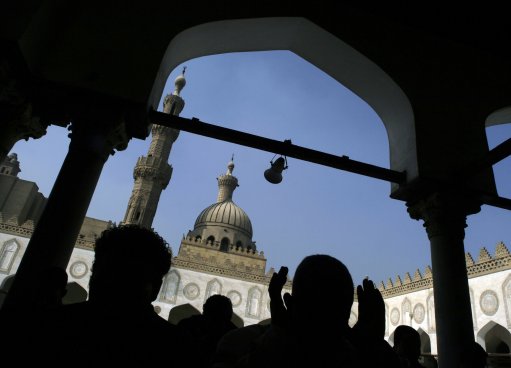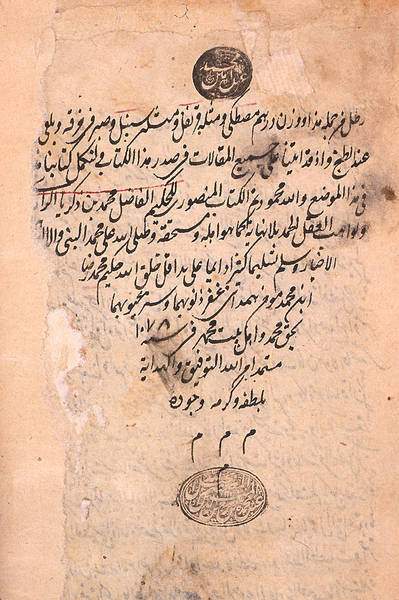
The question is a serious and important one, and also highly sensitive. But it is a question which must be posed forcefully now in all studies on the Orient. We also have to pose this question quietly to ourselves, relying on our intellectual side rather than on our emotions, or any instincts we may have towards preserving a traditional view.
THE PURPOSE of any answer to the question is neither to rally to the aid of Islam, nor to disparage it, but rather to support the interests of the country and its inhabitants at a time when we are precariously balanced on a see-saw, with our Islam alongside us at one end hanging over the edge of a cliff, and on the other end the full weight of modern, civic human civilization. If we shudder it will shudder too, it may cling to its end so that we do not fall into the abyss of forgotten history, but it will not stay like that for long without a redoubled effort from our side to prevent a wholesale plunge into a black hole of history.
Now, to get straight to the point, we can pose the question quite simply: is the backwardness which all and sundry make fun of us a question of backwardness in knowledge and culture, or a backwardness in religion? The religious class will answer this in the usual, glib way falling thereby straight into a trap: “our backwardness is the result of a defect that has sullied the faith of the Muslims, one that has led their Lord to abandon them, while the Americans have remained loyal to the Cross and to Jesus, and God has therefore granted them the victory”. This is how the world appears to be according to this vision, as if we were living in a time of the Olympian gods and the legends of the Iliad and the Odyssey. Such an explanation constitutes a huge leap into the bowels of superstition and a return to the world of myth. It is remarkable that this explanation for the backwardness of Muslims should be so widely circulated by Muslim clerics in the religious channels and across all media.
What appears to have escaped the shaykhs when they put forward this view of theirs on the causes of the backwardness, so as to chastise the people and accuse them of sin, is that they are the ones who over history have been primarily responsible for the Islamic faith. To this day they claim that they are responsible for Islam in the world. So if backwardness has ensued in matters of religion then it is they who should be held primarily responsible for this backwardness. So after a backwardness which has lasted eons we cannot maintain confidence in them. They have not taken proper care of God’s religion although this was precisely their function. If they reply that they have no control over what goes on inside the hearts of the believers – since this is the domain of free conscience – we can say to them: ‘You are right, but at the same time you have also been the guardians of the faith, the inspectors of people’s conscience, exercising authority over the people, and right up to the present day the ones implementing the religious rulings.’
It should be enough for the reader just to cast an eye over the 2004 Summary Report of the proceedings of Al-Azhar’s Institute of Studies to get an idea of just how many people this Institute has launched accusations against, all of the charges relating to matters concerning the sincerity of a person’s faith. In their defence of the religion they have historically been the judge, the prosecution, the verdict and the executioner. They claim that the backwardness of Muslims is due to the alienation of these last from their religion, yet they have been the ones historically responsible for the religion in this world. Which means that whoever falls short in his obligations to his faith, these shortcomings can no longer be ascribed to the religion, or to the nation, or to the people.
Religion has nothing to do with backwardness, and equally nothing to do with progress
Our shaykhs have no way out of this trap of history other than to recognize the sincerity of the people’s faith, and withdraw all their accusations of infidelity and charges against the simple Muslims who, in keeping to their religion, have never once made a penny from Islam or got their hands on any gifts, endowments, alms or alms tax or enjoyed the favour of the Sultan. They have kept to it solely because it is their faith and a major part of their culture and identity. They kept to it despite tasting the bitterness of poverty, and while poverty in turn devoured them. All this because they were simple people who loved their religion and refused to give up on it.
When they have recognised this and taken back their accusations, they should then acknowledge that our backwardness obtains equally in the realm of knowledge and the sciences of civilization. And it is from here in particular that they should withdraw altogether, since religious clerics have no role in scientific research of any kind. This is the realm of philosophers, social scientists, historians, mathematicians, physicists and chemists. These sciences are outside the realm of religion and certainly beyond the comprehension of religion’s men, for even today these are living in the 10th century and imprisoning the entire nation within its ramparts. Do these people seriously think they can enter into cultural competition with nations living in the 21st century? No, dear sirs, you are simply not in the running.
So does it follow from this that Islam has kept the nation backward? Such a question ignores the progress made by the Islamic Nation during its first four centuries. Therefore Islam cannot be the source of backwardness! But if this is so, and it is a civilised religion, why is it that we are backward today?
It seems that there is some confusion in the question which is muddying the water. Religion in itself is not part of the issue. It is outside the game and has nothing to do with backwardness, in the same way that, equally, it has nothing to do with progress. Islam as a faith was never an ingredient in the achievements of al-Razi (Rhazes), al-Farabi (Alpharabius) or Ibn al-Haytham (Alhazen), nor a factor in the disappearance from our lands of this sole constellation of luminaries, whom we fondly evoke in lamentation for our buried culture whenever we speak in defence of Islam, while Islam has nothing to do with it. Yet within this same Islam some east Asian states have scored progress and are dubbed ‘Asian Tigers’ for their dynamic leap onto the train of civilization, while in this same Islam are also living the rest of the Muslim states, trailing far behind all other countries.
The problem lies not in the religion, nor in any religion. It lies in the way this religion is utilized. Some make use of it to achieve progress, others to maintain backwardness. Some respect religion and distance it from political games and the intrigues of shaykhs and sultans, but there are others who continue to exploit it to maintain a single way of thinking and a single vision, so as to stay master of the castle in every sphere and every issue. To these, issues concerning the nation, the people or the religion do not pre-occupy him so much as maintaining domination and authority over the mind of the Muslim, and retaining this all-embracing authoritarian control by effectively enslaving the people.
It is a stand taken by everyone who is engaged in Islam as a profession and as a source of income, by those who have the power to mould the consciousness of the people according to imperious, authoritarian priorities. It is a consciousness of the single view to the exclusion of all others. They claim that this is the true Islam and that all else constitutes sinful disbelief. This leaves no room at any time for any alternative view to emerge. Accordingly no opposition has ever appeared over the entire history of the Muslims. If anything of this nature did appear its ideological instrument was invariably some alternative reading of this same Islam. But in general, over the entire length of Islamic history, their efforts petered out to leave in place a type of society that only knew of one, uniquely saved, denomination.
So we have therefore uncovered a first reason that we may connect with Islam:
That is, the absence of any other point of view which could foster a rich discussion concerning religion and life and come up with something new, as occurred when the earliest Christians differed on their interpretations of the Gospel, of God and the Holy Spirit. Those who differed held councils which relied on the strength of the arguments of the protagonists, so that the matter ended with a settlement that the majority conceded to. When new differences surfaced, new councils were convened. Such were the Councils of Nicaea, Chalcedon and Ephesus, and the like. This attitude was the afterglow of Greco-Roman culture. But on the Islamic side the first and the last ‘council’ was that of the Saqīfat Banī Sā‘ida [1] in which was decided the formula for Islamic rule, politically and religiously, all other things being deemed outright error.

Suggested Reading
This formula went from crisis to crisis until some resolution emerged, but only after a series of crushing civil wars beginning with the Apostasy Wars and carrying on and beyond Karbalā. During this time this isolated, oppressed region continued to give off the appearance of power, but it did not take long before it was suppressed and its leaders wiped out, whether by the Zanj rebellion or the Assassins or the Qarmatians or by others. All that remained operative was the primordial, tribal, Caliphal principle that cannot accept rivals, due to its claim that this is the true Islam that God demands – as if they had somehow ascended into the heavens and taken down all the miraculous details in their writings on fiqh: all their interpretations, sanctions, commentaries and fatwās, straight from the mouth of God Himself, who privileged them above all others with this insight.
Christianity since its very inception spoke to the people of the time in their language and their way of thinking. It gave to Caesar what was Caesar’s and to God what was God’s, separating the two domains, and by doing so stood in the Greek tradition where democratic principles were still operating.
The Islamic caliphate system, complete with its religious dressing and the close alliance of its professional clerics, was an example of the total amalgamation of religious and worldly powers, taking the example of the Prophet, who held all the powers in himself in his fledgling state, as a template for rule under an absolute ruler in terms of his powers, influence, and absolutely dominant, single religious conception. By so doing they failed to make a distinction between the Prophet as the unique prophet and the Seal of the Prophets, and themselves as heirs to the Prophethood – an office which is not in fact a hereditary one.
It seems that the reason, in the end, for our backwardness is the men of religion themselves and their opportunistic allies throughout history. When compared with the language of modernity, does not their discourse today appear somewhat redolent of the Middle Ages?
[1] The discussions at Saqīfat Banī Sā‘ida took place following the death of the Prophet, as a result of which Abu Bakr was nominated his successor (khalīfa, ‘Caliph’). (Ed.)


